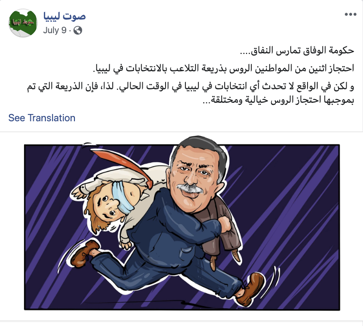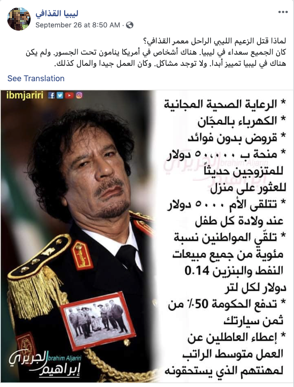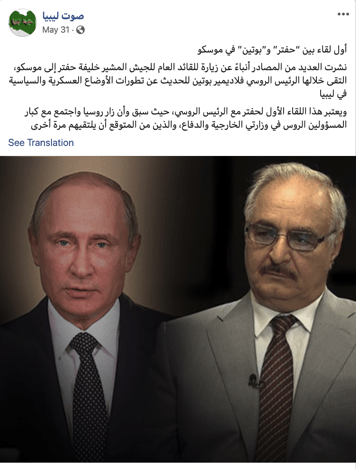By Nathaniel Gleicher, Head of Cybersecurity Policy
Today, we removed three networks of accounts, Pages and Groups for engaging in foreign interference — which is coordinated inauthentic behavior on behalf of a foreign actor — on Facebook and Instagram. They originated in Russia and targeted Madagascar, Central African Republic, Mozambique, Democratic Republic of the Congo, Côte d’Ivoire, Cameroon, Sudan and Libya. Each of these operations created networks of accounts to mislead others about who they were and what they were doing. Although the people behind these networks attempted to conceal their identities and coordination, our investigation connected these campaigns to entities associated with Russian financier Yevgeniy Prigozhin, who was previously indicted by the US Justice Department. We have shared information about our findings with law enforcement, policymakers and industry partners.
We’re constantly working to detect and stop this type of activity because we don’t want our services to be used to manipulate people. We’re taking down these Pages, Groups and accounts based on their behavior, not the content they posted. In each of these cases, the people behind this activity coordinated with one another and used fake accounts to misrepresent themselves, and that was the basis for our action.
We are making progress rooting out this abuse, but as we’ve said before, it’s an ongoing challenge. We’re committed to continually improving to stay ahead. That means building better technology, hiring more people and working closer with law enforcement, security experts and other companies.
What We’ve Found So Far
Today, we removed 35 Facebook accounts, 53 Pages, seven Groups and five Instagram accounts that originated in Russia and focused on Madagascar, the Central African Republic, Mozambique, Democratic Republic of the Congo, Côte d’Ivoire and Cameroon. The individuals behind this activity used a combination of fake accounts and authentic accounts of local nationals in Madagascar and Mozambique to manage Pages and Groups, and post their content. They typically posted about global and local political news including topics like Russian policies in Africa, elections in Madagascar and Mozambique, election monitoring by a local non-governmental organization and criticism of French and US policies.
- Presence on Facebook: 35 Facebook accounts, 53 Pages, 7 Groups and 5 Instagram accounts.
- Followers: About 475,000 accounts followed one or more of these Pages and around 450 people followed one or more of these Groups and around 650 people followed one or more of these Instagram accounts.
- Advertising: Around $77,000 in spending for ads on Facebook paid for in US dollars. The first ad ran in April 2018 and the most recent ad ran in October 2019.
We found this activity as part of our internal investigations into Russia-linked, suspected coordinated inauthentic behavior in Africa. Our analysis benefited from open source reporting.
Below is a sample of the content posted by some of these Pages:

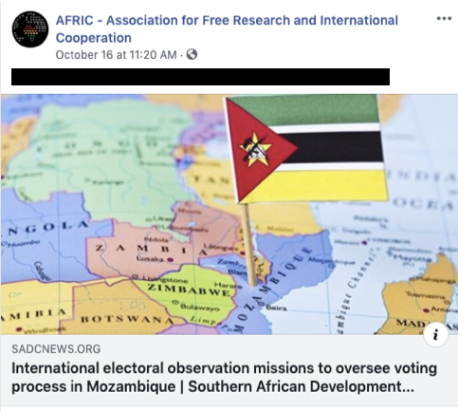
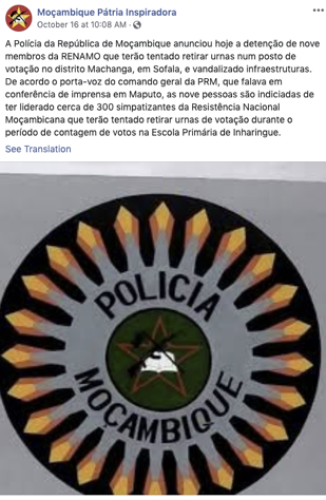
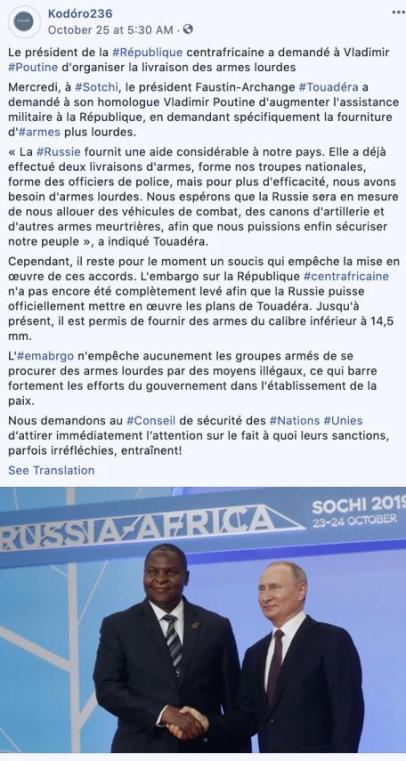
However, there is still an issue which is blocking us to implement this. The embargo on Central African Republic was not fully lifted in order for Russia to implement the plans of Touadera. Until now, it is only possible to supply weapons with a caliber less than 14,5 mm.
The embargo do not stop armed groups to get illegally heavy weapons for themselves, which is not helping the efforts of the government to establish peace.
We ask the Security Council of United Nations to draw attention on what their (sometimes reckless) sanctions are bringing.
We also removed 17 Facebook accounts, 18 Pages, 3 Groups and six Instagram accounts that originated in Russia and focused primarily on Sudan. The people behind this activity used a combination of authentic accounts of Sudanese nationals, fake and compromised accounts — some of which had already been disabled by our automated systems — to comment, post and manage Pages posing as news organizations, as well as direct traffic to off-platform sites. They frequently shared stories from SUNA (Sudan’s state news agency) as well as Russian state-controlled media Sputnik and RT, and posted primarily in Arabic and some in English. The Page administrators and account owners posted about local news and events in Sudan and other countries in Sub-Saharan Africa, including Sudanese-Russian relations, US-Russian relations, Russian foreign policy and Muslims in Russia.
- Presence on Facebook and Instagram: 17 Facebook accounts, 18 Pages, 3 Groups and 6 accounts on Instagram.
- Followers: About 457,000 accounts followed one or more of these Pages, about 1,300 accounts joined at least one of these Groups and around 2,900 people followed one or more of these Instagram accounts.
- Advertising: Around $160 in spending for ads on Facebook paid for in Russian rubles. The first ad ran in April 2018 and the most recent ad ran in September 2019.
We found this activity as part of our internal investigations into Russia-linked, suspected coordinated inauthentic behavior in the region.
Below is a sample of the content posted by some of these Pages:
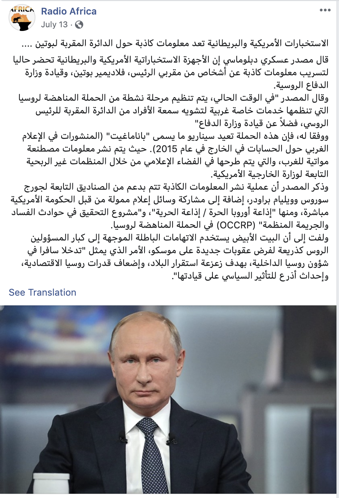
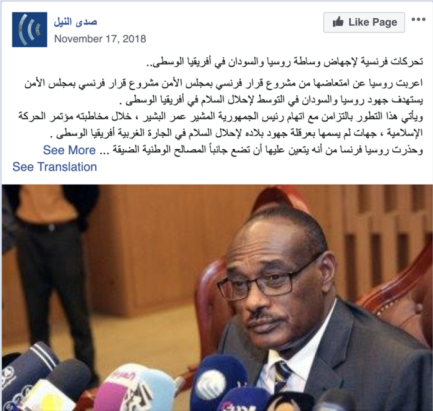
Post translation (first paragraph only): French movements to abort Russian and Sudanese mediation in the Central African Republic…
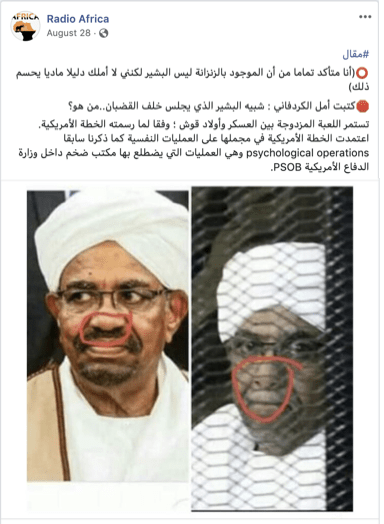
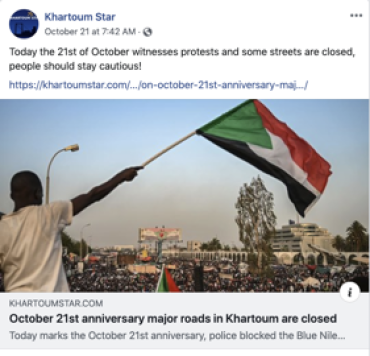
Finally, we removed a network of 14 Facebook accounts, 12 Pages, one Group and one Instagram account that originated in Russia and focused on Libya. The individuals behind this activity used a combination of authentic accounts of Egyptian nationals, fake and compromised accounts — some of which had already been disabled by our automated systems — to manage Pages and drive people to an off-platform domain. They frequently shared stories from Russian state-controlled media Sputnik and RT. The Page admins and account owners typically posted in Arabic about local news and geopolitical issues including Libyan politics, crimes, natural disasters, public health, Turkey’s alleged sponsoring of terrorism in Libya, illegal migration, militia violence, the detention of Russian citizens in Libya for alleged interference in elections and a meeting between Khalifa Haftar, head of the Libyan National Army, and Putin. Some of these Pages posted content on multiple sides of political debate in Libya, including criticism of the Government of National Accord, US foreign policy, and Haftar, as well as support of Muammar Gaddafi and his son Saif al-Islam Gaddafi, Russian foreign policy, and Khalifa Haftar.
- Presence on Facebook and Instagram: 14 Facebook accounts, 12 Pages, one Group and one account on Instagram.
- Followers: About 212,000 accounts followed one or more of these Pages, 1 account joined this Group and around 29,300 people followed this Instagram account.
- Advertising: About $10,000 USD paid for primarily in US dollars, euros and Egyptian pounds. The first ad ran in May 2014 and the most recent ad ran in October 2019.
Based on a tip shared by the Stanford Internet Observatory, we conducted an investigation into suspected Russia-linked coordinated inauthentic behavior and identified the full scope of this activity. Our analysis benefited from open source reporting.
Below is a sample of the content posted by some of these Pages:
